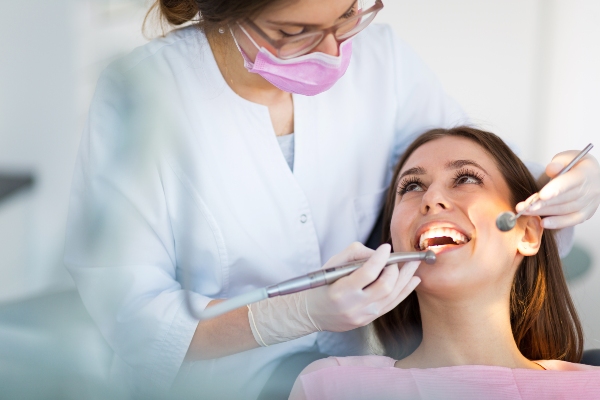What are Common Causes of TMJ?

TMJ refers to the temporomandibular joint, which often dysfunctions, resulting in serious pain. Individuals that suffer from TMJ disorder often turn to their general dentist to learn more about treatment options, as well as the root cause of the disorder. Each person varies, meaning the cause of their TMJ may differ, however, there are a few relatively common factors.m
TMJ treatment from a general dentist
Many are surprised to learn that general dentists can treat TMJ disorders, however, they are often the first contact when symptoms occur. General dentists undergo extensive training, which prepares them to diagnose and treat conditions that affect the facial area and the jaw.
What causes TMJ disorder?
According to MedicineNet.com, temporomandibular joint syndrome is a disorder of the jaw muscles and nerves caused by injury or inflammation to the joint. The list below includes three of the most common causes of TMJ disorder.
#1 – Teeth clenching, grinding
When individuals participate in the act of clenching or grinding their teeth, it is possible for them to eventually develop a problem with their jaw joints, leading to a TMJ disorder diagnosis. Constantly grinding or clenching the teeth places a lot of stress on the jaw, which can lead to any number of jaw-related problems. Patients who are diagnosed with TMJ due to bruxism need to find the reason why they clench or grind their teeth, with popular reasons including experiencing a great deal of stress and/or anxiety.
#2 – Jaw and/or teeth misalignments
When an individual's jaw and/or teeth are not in their proper alignment, they are likely to experience jaw joint problems. Two of the more common reasons why someone would experience a misalignment of their jaw include any type of injury or being born with a jaw-related birth defect. Misalignments in one’s teeth mean the teeth do not come together exactly as they are supposed to, which often results in an under or overbite. Both of these problems can lead to one being diagnosed with TMJ disorder.
#3 – Arthritis
Rheumatoid arthritis and osteoarthritis are two of the more common types of arthritis that can lead to someone being diagnosed with a TMJ-related disorder. This is because arthritis is known to damage the cartilage in the jaw joints. Additionally, the fact that arthritis causes various levels of inflammation and pain in the jaw area, makes it a real possibility for those living with arthritis to eventually be diagnosed with TMJ disorder, thus resulting pain.
In need of a diagnosis?
Thinking you may have TMJ after reading the above common causes? Those who think they may have this jaw disorder need to first be properly diagnosed, as treatment options depend on one’s particular situation. Since the causes of TMJ disorder are now understood, it is best to consult with a general dentist. An evaluation can be done to determine the appropriate course of treatment. Reach out today to get started!
Request an appointment here: https://www.healthysmilesgeorgetown.com or call Healthy Smiles Dentistry Georgetown at (512) 864-9010 for an appointment in our Georgetown office.
Check out what others are saying about our dental services on Yelp: TMJ Dentist in Georgetown, TX.
Recent Posts
TMJ disorder occurs when the temporomandibular joint is injured or overworked. The joint is responsible for connecting the skull and the jawbone, and it plays an important role in the jaw movement. When TMJ disorder develops, symptoms develop and can worsen without appropriate treatment. There are many different symptoms of TMJ disorder, but some TMJ symptoms…
Find out more about TMJ, a common jaw-related disorder. Visiting a general dentist allows individuals to receive a proper diagnosis, as well as understand how severe the TMJ is. Once diagnosed, treatment is the next step.Understanding what TMJ is and how it can affect one’s oral health is important. Since TMJ can also affect one’s…
Wanting your general dentist to help you experience less TMJ pain? Some of the more common symptoms associated with temporomandibular joint disorder include a clicking of the jaw, headaches, earaches, pain when opening the mouth wide and overall tenderness in the jaw muscles. If you are experiencing even one of these symptoms, you will also…
Temporomandibular joints better-known as TMJ connect your jawbone to your skull. There is one on each side of your face. Your TMJ act as sliding hinges, allowing you to move your jaw when you speak, eat or otherwise move your mouth.A TMJ disorder occurs when one or both of these joints becomes damaged due to…


